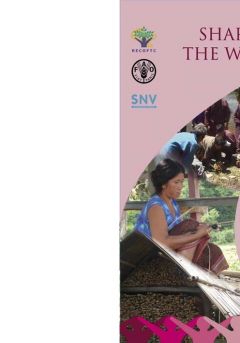Location
SNV is a non-profit, international development organisation, established in the Netherlands in 1965. We have been present on the ground in developing countries for over 40 years, and now operate in 35 countries in Africa, Asia, Latin America and the Balkans.
What do we do?
Our aim is to alleviate poverty by enabling those on the lowest incomes to be part of social and economic networks and so increase their income and employment opportunities. More than half of our work focuses on economic and private sector development, wherein secured access to natural resources is a key attention point. Alongside this, we contribute to improving people’s access to basic services like water and sanitation, energy and education. We achieve both by strengthening local organisations.
Promoting gender equity and transparent public sector leadership is at the heart of all our work. We believe these principles are essential to building stronger societies.
We work in the areas where our support is most needed. The majority of our advisors are based far from capital cities, in provincial towns and in rural areas, where the challenges of poverty are often greatest. From this sub-national level, we can facilitate links between local and national organisations.
Members:
Resources
Displaying 6 - 10 of 15Sharing the Wealth: Policy and Legal Frameworks to Support Equitable Sharing of Costs and Benefits from Community Forestry
Community forestry has great potential to improve the welfare of the estimated 450 million impoverished people living in and around forests in Asia. But the extent to which this potential is realized depends strongly upon whether communities are able to secure the benefits that community managed forests generate, and whether these actually reach the poorest at the community level. The real benefits obtained in return for the time and energy expended by communities in forest management helps to gain their long-term commitment to sustainable forest management.
Sharing the Wealth: Policy and Legal Frameworks to Support Equitable Sharing of Costs and Benefits from Community Forestry
Community forestry has great potential to improve the welfare of the estimated 450 million impoverished people living in and around forests in Asia. But the extent to which this potential is realized depends strongly upon whether communities are able to secure the benefits that community managed forests generate, and whether these actually reach the poorest at the community level. The real benefits obtained in return for the time and energy expended by communities in forest management helps to gain their long-term commitment to sustainable forest management.
Sharing the Wealth: Policy and Legal Frameworks to Support Equitable Sharing of Costs and Benefits from Community Forestry
Community forestry has great potential to improve the welfare of the estimated 450 million impoverished people living in and around forests in Asia. But the extent to which this potential is realized depends strongly upon whether communities are able to secure the benefits that community managed forests generate, and whether these actually reach the poorest at the community level. The real benefits obtained in return for the time and energy expended by communities in forest management helps to gain their long-term commitment to sustainable forest management.
Sharing the Wealth: Policy and Legal Frameworks to Support Equitable Sharing of Costs and Benefits from Community Forestry
Community forestry has great potential to improve the welfare of the estimated 450 million impoverished people living in and around forests in Asia. But the extent to which this potential is realized depends strongly upon whether communities are able to secure the benefits that community managed forests generate, and whether these actually reach the poorest at the community level. The real benefits obtained in return for the time and energy expended by communities in forest management helps to gain their long-term commitment to sustainable forest management.
Sharing the Wealth: Policy and Legal Frameworks to Support Equitable Sharing of Costs and Benefits from Community Forestry
Community forestry has great potential to improve the welfare of the estimated 450 million impoverished people living in and around forests in Asia. But the extent to which this potential is realized depends strongly upon whether communities are able to secure the benefits that community managed forests generate, and whether these actually reach the poorest at the community level. The real benefits obtained in return for the time and energy expended by communities in forest management helps to gain their long-term commitment to sustainable forest management.


